50mbuffalos.mono.net
- Photos
- Analysis
- Music
- Protests
- Action
-
Blog
- Tzaddikim
- Why humanism
- Beyond protesting
- Hand drilling a regime
- Talking revolution
- Cyrus the Great
- Iran's new era
- Dust storm
- Being Ali Khamenei
- Enter the clerics
- Why so silent?
- Lunatic runs asylum
- Uncentred
- Who to Believe
-
Media Superiority
- Journalism from Iran
- Losing the Grip
- Persian Lion
- Revoking Godwin's Law
- USA out of Iran
- Not Getting It
- Breaking Monopoly
- Geopolitical Crisis
- Lost in Translation
- What next?
- Green Ninjas
- Evin Prison
- Ghoba Mosque
- Radiant face
- Too Civilized
- Swedish riots
- Eerie silence
- Baharestan Sq
- Death of Neda
- News
- Basics
Using Media Superiority
In military doctrine there are three levels of air dominance: Air parity, air superiority and air supremacy. These terms may be useful to analyze the current media war between reformists and fundamentalists in and around Iran.
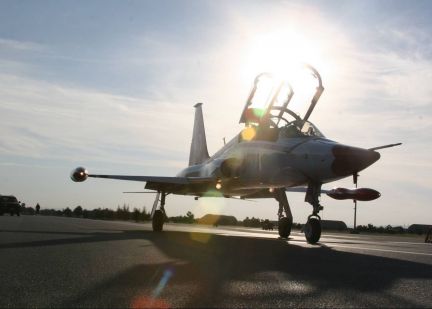
Much has been written about oppressive rule in Iran, particularly since the 2005 election, where the media coverage peaked. Even if I haven't seen the updated statistics for June 2009 it is safe to say the record has been broken.
The Sea of Green has, in two weeks, established firm media superiority.
The Sea of Green has, in two weeks, established firm media superiority.
Reformist media parity
If you translate the military doctrine of NATO to modern day media war,
media parity is the ability to cover your own ground troops.
Through the use of cutting edge technologies like proxies, cell phone cameras and social websites the protesters in Iran have been able to document the widespread civil and human rights abuse in Iran like never before.
Yet, in spite of geopolitical tensions involving Iran and widespread support from the right wing in USA and Europe Iranian expatriates have never fully penetrated the air space with their message - not until Mousavi and his supporters took to the street in a historical campaign with messages of openness to the rest of the world, civil rights and equality for women.
Through the use of cutting edge technologies like proxies, cell phone cameras and social websites the protesters in Iran have been able to document the widespread civil and human rights abuse in Iran like never before.
Yet, in spite of geopolitical tensions involving Iran and widespread support from the right wing in USA and Europe Iranian expatriates have never fully penetrated the air space with their message - not until Mousavi and his supporters took to the street in a historical campaign with messages of openness to the rest of the world, civil rights and equality for women.
Reformist media superiority
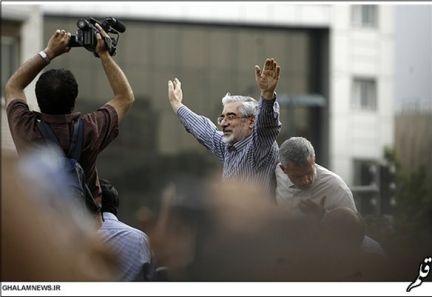
Media superiority was rapidly gained, as Iran's clerical rule under the leadership of Khamenei and Ahmadinejad began a harsh clamp-down on protesters, few days after the contested election.
It was not a case of total dominance of the air space, but the messages of Khamenei and Ahmadinejad were effectively shot down by graphic imagery and a steady stream of reports from Twitter bombing any illusion of a peaceful or remotely cooperative Iranian regime to dust.
This paved the ground for any and all suggestions of direct interference with Iranian politics, ranging from military engagement over economic sanctions to harsh language. But the general picture is one of widespread global support for the protesters and their struggle for freedom, democracy and human rights.
It was not a case of total dominance of the air space, but the messages of Khamenei and Ahmadinejad were effectively shot down by graphic imagery and a steady stream of reports from Twitter bombing any illusion of a peaceful or remotely cooperative Iranian regime to dust.
This paved the ground for any and all suggestions of direct interference with Iranian politics, ranging from military engagement over economic sanctions to harsh language. But the general picture is one of widespread global support for the protesters and their struggle for freedom, democracy and human rights.
Government media interdiction
Media supremacy is when you completely dominate the airwaves with your message. The death of Michael Jackson blew a whole in that aspiration, reminding protester in Iran and supporters abroad they are human and entangled in a potentially long and painful battle.
Defection from ranks occurred, as those who were merely wrapped up in the hype found other interests. The Wall of Green began to unravel, as #iranelection tumbled from the Trending Topics on Twitter, but other developments quickly took over and kept Iran in the limelight.
Iran managed to get the world governments involved in a budding international incident with a combination of embassy staff arrests (UK) and wild accusations against USA, Israel, France, UK and Germany, claiming they had instigated unrest.
At the same time the Tehran government began a targeted effort to cut media support by way of air interdiction. They intensified cell phone control, satellite dish collection, Internet blockade and, first of all, clamp-downs against dissidents.
Defection from ranks occurred, as those who were merely wrapped up in the hype found other interests. The Wall of Green began to unravel, as #iranelection tumbled from the Trending Topics on Twitter, but other developments quickly took over and kept Iran in the limelight.
Iran managed to get the world governments involved in a budding international incident with a combination of embassy staff arrests (UK) and wild accusations against USA, Israel, France, UK and Germany, claiming they had instigated unrest.
At the same time the Tehran government began a targeted effort to cut media support by way of air interdiction. They intensified cell phone control, satellite dish collection, Internet blockade and, first of all, clamp-downs against dissidents.
Government media parity
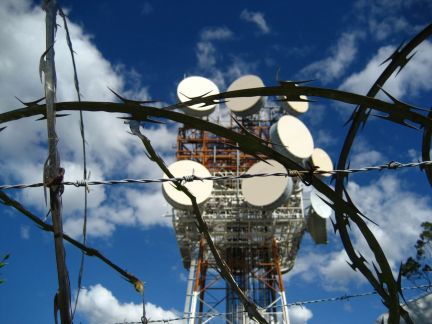
None of these efforts, however, significantly altered the balance of
power between Sea of Green and Mahmoud Ahmadinejad's forces. The main
strike was to bar journalists, leaving them to report, time after time:
The search phrase so far collects 569.000 hits on Google.
Under these conditions it is impossible to establish air superiority. Under the rules of journalism it is impossible to provide adequate coverage of the "ground troops", the Iranians held hostage in the iron grip of theocratic Iran.
This means, for all the advantages of the movement, there is a major gap in the air space they can control, and Iran's government has set in with an endless stream of spin, including those conspiracy theories about foreign government involvement and false testimonies given under torture and aired on Iranian state TV.
"Iranian authorities have barred journalists for international news organizations from reporting"
The search phrase so far collects 569.000 hits on Google.
Under these conditions it is impossible to establish air superiority. Under the rules of journalism it is impossible to provide adequate coverage of the "ground troops", the Iranians held hostage in the iron grip of theocratic Iran.
This means, for all the advantages of the movement, there is a major gap in the air space they can control, and Iran's government has set in with an endless stream of spin, including those conspiracy theories about foreign government involvement and false testimonies given under torture and aired on Iranian state TV.
Regaining media parity
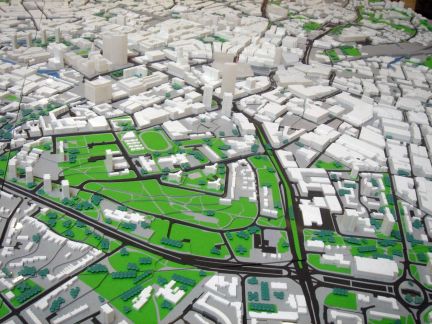
This leaves two options for the movement: Either it must declare the media battle in Iran over and take the message abroad, transforming it from a battle of information and ideas to a politicial issue.
This means diplomacy, negotiations, sanctions - and even, down the road, a possibility for military conflict.
The ground is wide open to this approach, with Iran being already a geopolitical hot spot, threatening Israel, striving to gain nuclear capacity for, quite likely, military purposes and wielding considerable power over Shia Muslims and, in particular, allies in Lebanese Hezbollah and Palestinian Hamas.
There are lots of political interests involved, and lots of allies to pick from, but the outcome of foreign intervention is uncertain - except for the certainty of mass casualties on both sides of the equasion.
The other option is to try to take back media superiority on Iranian ground, meaning: Launch counter-strikes, combining low tech forms of communication like writing slogans on bills, painting graffiti signs in the night, shouting Allahu Akhbar and flashing car lights.
This means diplomacy, negotiations, sanctions - and even, down the road, a possibility for military conflict.
The ground is wide open to this approach, with Iran being already a geopolitical hot spot, threatening Israel, striving to gain nuclear capacity for, quite likely, military purposes and wielding considerable power over Shia Muslims and, in particular, allies in Lebanese Hezbollah and Palestinian Hamas.
There are lots of political interests involved, and lots of allies to pick from, but the outcome of foreign intervention is uncertain - except for the certainty of mass casualties on both sides of the equasion.
The other option is to try to take back media superiority on Iranian ground, meaning: Launch counter-strikes, combining low tech forms of communication like writing slogans on bills, painting graffiti signs in the night, shouting Allahu Akhbar and flashing car lights.
No protests turns it geopolitical
The lower level intensity protesting, however, combined with the lack of coverage in the Iranian "no fly zone" for foreign journalists and clamp-downs on domestic media makes it very difficult.
Fighting to regain media parity immediately tells you the opponent is winning. Iranian government is currently holding media parity on domestic territory with a small percentage, straining its forces to hit the reformist movement with a critical blow.
Unless the movement is ready to make the movement political the air superiority in the West "only" contributes moral support and some technical reinforcement.
Of course, it would be critical for the movement to lose these "supplies", but at this point there is little threat that Ahmadinejad would be able to compromise the movement in the eyes of the outside world. It is, after all, their battle too.
If Iranians are to deal with matters themselves, they will need to gain control of the Iranian air space. And the only people who can effectively and legitimately - without making it a geopolitical issue - are Iranian expatriates.
Fighting to regain media parity immediately tells you the opponent is winning. Iranian government is currently holding media parity on domestic territory with a small percentage, straining its forces to hit the reformist movement with a critical blow.
Unless the movement is ready to make the movement political the air superiority in the West "only" contributes moral support and some technical reinforcement.
Of course, it would be critical for the movement to lose these "supplies", but at this point there is little threat that Ahmadinejad would be able to compromise the movement in the eyes of the outside world. It is, after all, their battle too.
If Iranians are to deal with matters themselves, they will need to gain control of the Iranian air space. And the only people who can effectively and legitimately - without making it a geopolitical issue - are Iranian expatriates.
Call in reinforcement
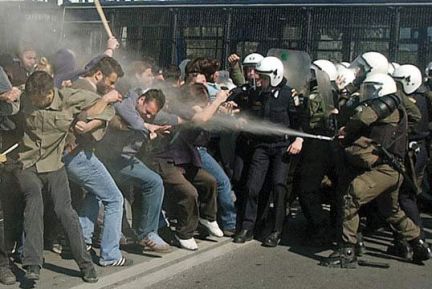
With an estimated 2-3 million Iranian expatriates, most of them well
educated and highly productive citizens, the movement has what you may
call a reserve force at hand.
Many of the Iranian expatriates have close relatives in Iran and a vested interested in either reform of the political system or, alternatively, a regime change.
I suspect they, more than anybody else, represent the otuside force meddling with Iranian politics. They are immersed in the freedom of Western societies, well acquainted with the methodology of civil rights movements and capable of leaking cultural messages between the Iranians and the outside world.
Judging from new and older independent Iranian media outlets they are quite aware of what is at stake and how to respond to the crisis in Iran.
Media and tech savvy like so many bicultural groups motivated to overachieve, become skilled at communication and form communities enhanced by online social networking platforms they are already primed for the assignment.
And with the explosive interest in the Iranian reformist movement capturing the imagination of the world they are in a position to utilize the media superiority on Western soil. With no eyes and ears on the ground journalists are increasingly calling on Iranian expatriates as sources for both situation updates and in depth analysis.
Many of the Iranian expatriates have close relatives in Iran and a vested interested in either reform of the political system or, alternatively, a regime change.
I suspect they, more than anybody else, represent the otuside force meddling with Iranian politics. They are immersed in the freedom of Western societies, well acquainted with the methodology of civil rights movements and capable of leaking cultural messages between the Iranians and the outside world.
Judging from new and older independent Iranian media outlets they are quite aware of what is at stake and how to respond to the crisis in Iran.
Media and tech savvy like so many bicultural groups motivated to overachieve, become skilled at communication and form communities enhanced by online social networking platforms they are already primed for the assignment.
And with the explosive interest in the Iranian reformist movement capturing the imagination of the world they are in a position to utilize the media superiority on Western soil. With no eyes and ears on the ground journalists are increasingly calling on Iranian expatriates as sources for both situation updates and in depth analysis.
Protesters, techies and journos
No matter what it is important to remember that with the combination of three factors the movement cannot lose its media superiority:
1) On the ground protests
2) Direct wire from Iranian soil
3) Western media access
Iran may control the national media, but they cannot fully control the Internet. The only way to establish 100 % control is to take Iran offline, in which case
For a media strategy to run smoothly, maximizing the effect of the protests, protesters must be active, sacure connectivity to the outside world must be maintained, and media workers - including bloggers - must be ready to receive and process and distribute reports.
1) On the ground protests
2) Direct wire from Iranian soil
3) Western media access
Iran may control the national media, but they cannot fully control the Internet. The only way to establish 100 % control is to take Iran offline, in which case
While these voyeurism desires would go unfulfilled, and the Iranian people might be at more risk of extreme actions form the regime, the regime it's self would be paralyzed.
Banking, phones, TV, Military com would come to a stand still
Iran has already put the Internet locally to a hault, while they were installing wiretapping devices, and the connection has reportedly run as low as 10 % of capacity during crucial stages of the protests.Banking, phones, TV, Military com would come to a stand still
For a media strategy to run smoothly, maximizing the effect of the protests, protesters must be active, sacure connectivity to the outside world must be maintained, and media workers - including bloggers - must be ready to receive and process and distribute reports.
No immunity to media storms
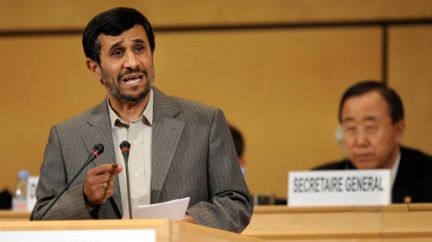
Sometimes it would seem that the Iranian government is immune to mediated "air raids" from outside, and that their only concern would be controlling the Iranian air waves, terrorizing the opposition to silence and thus to stagnation or atrophy.
The brutality of the clamp-downs and the calls for harsh measures against Mousavi and against protesters could give the impression the government is locked in fanaticism and oblivious to pressure from foreign government.
The rationale, however, is to win the media war. It is obvious the Iranian government cares. The only reason why Mousavi and the leading dissident clerics are still alive and at large is that the Iranian government must keep up appearances.
Damaging the international standing of the Iranian government does have some effect. And the feeble attempts to compromise the opposition by way of false confessions derived by torture testifies to their desperation.
The confusion about the motives of the clerical rule stems from the fact that they have to communicate on two levels, internally and externally, an exercise no state leader has fully mastered in the age of globalized mass communication at hyperspeed.
The brutality of the clamp-downs and the calls for harsh measures against Mousavi and against protesters could give the impression the government is locked in fanaticism and oblivious to pressure from foreign government.
The rationale, however, is to win the media war. It is obvious the Iranian government cares. The only reason why Mousavi and the leading dissident clerics are still alive and at large is that the Iranian government must keep up appearances.
Damaging the international standing of the Iranian government does have some effect. And the feeble attempts to compromise the opposition by way of false confessions derived by torture testifies to their desperation.
The confusion about the motives of the clerical rule stems from the fact that they have to communicate on two levels, internally and externally, an exercise no state leader has fully mastered in the age of globalized mass communication at hyperspeed.
No immunity to media storms
International pressure does count. The lies about the foreign government interference is meant for the domestic audience, and Iran is eagerly looking for ways to repair the damage to its image as soon as the opposition has been brought to a hault.
Pressure does offer some relative protection for Iranians. But Iranian authorities are also able to exploit some cracks in the Western armour:
Partisan political split in attitudes to foreign policy, in particular militarism and destabilization games, strong disagreement about Israel, attitudes to Muslims and the Islamic world.
Most of all the government feeds off of the fundamental thesis that might is right and government authority, legitimate or not, provides some justification for a limited or considerable amount of abuse.
Finally, all measures of sanction involves some level of risk willingness, financially and when comes to security. All this combined creates a foundation for the "wait and see" attitude.
The political part of the process is an exercise in gradual and proportional increase of sanctions in order to keep the opposition able to move. If the opposition is put to a hault by violence and intimidation there can be no doubt the harshest of measures will be taken against Iran in very short time.
Pressure does offer some relative protection for Iranians. But Iranian authorities are also able to exploit some cracks in the Western armour:
Partisan political split in attitudes to foreign policy, in particular militarism and destabilization games, strong disagreement about Israel, attitudes to Muslims and the Islamic world.
Most of all the government feeds off of the fundamental thesis that might is right and government authority, legitimate or not, provides some justification for a limited or considerable amount of abuse.
Finally, all measures of sanction involves some level of risk willingness, financially and when comes to security. All this combined creates a foundation for the "wait and see" attitude.
The political part of the process is an exercise in gradual and proportional increase of sanctions in order to keep the opposition able to move. If the opposition is put to a hault by violence and intimidation there can be no doubt the harshest of measures will be taken against Iran in very short time.
Networking, media planning

The activist network has three challenges in order to gain what you may call global media supremacy, including Iranian airwaves:
1) To keep the opposition visible, strong and communicating effectively inside Iran
2) To secure avenues for dispatches in and out of Iran
3) To pick up and redistribute reports in the West
The political pressure rests on this threeway strategy.
Forming a proactive media strategy is the foremost duty of the involved activist bloggers, Iranian NGO's and human rights organizations.
In this world you can rely on human rights activists above and beyond any other group. They are loyal allies and prime sources for reporters, as long as they can stay clear of getting politicized and caught up in revolutionary schemes, which is not their business.
Bloggers, like journalists, tend to be fickle, but the blogosphere plays a crucial role in the food chain of information. Keeping bloggers involved on the current level is an exercise in creativity, but viral virtual assets are certain to pay off in mainstream media headlines, whenever critical mass is reached.
1) To keep the opposition visible, strong and communicating effectively inside Iran
2) To secure avenues for dispatches in and out of Iran
3) To pick up and redistribute reports in the West
The political pressure rests on this threeway strategy.
Forming a proactive media strategy is the foremost duty of the involved activist bloggers, Iranian NGO's and human rights organizations.
In this world you can rely on human rights activists above and beyond any other group. They are loyal allies and prime sources for reporters, as long as they can stay clear of getting politicized and caught up in revolutionary schemes, which is not their business.
Bloggers, like journalists, tend to be fickle, but the blogosphere plays a crucial role in the food chain of information. Keeping bloggers involved on the current level is an exercise in creativity, but viral virtual assets are certain to pay off in mainstream media headlines, whenever critical mass is reached.
An expert take on ground tactics
Right now the most urgent challenge is to keep the movement capable of
communicating inside Iran and allow it to grow, unfettered by the
government repression.
Anothe unlikely hero, the very founder of the Sepah - the notorious Iranian Revolutionary Guard - and an exiled formerly high ranking Iranian politician offers some interesting ground tactics for that purpose.
July 2 2009
Anothe unlikely hero, the very founder of the Sepah - the notorious Iranian Revolutionary Guard - and an exiled formerly high ranking Iranian politician offers some interesting ground tactics for that purpose.
July 2 2009